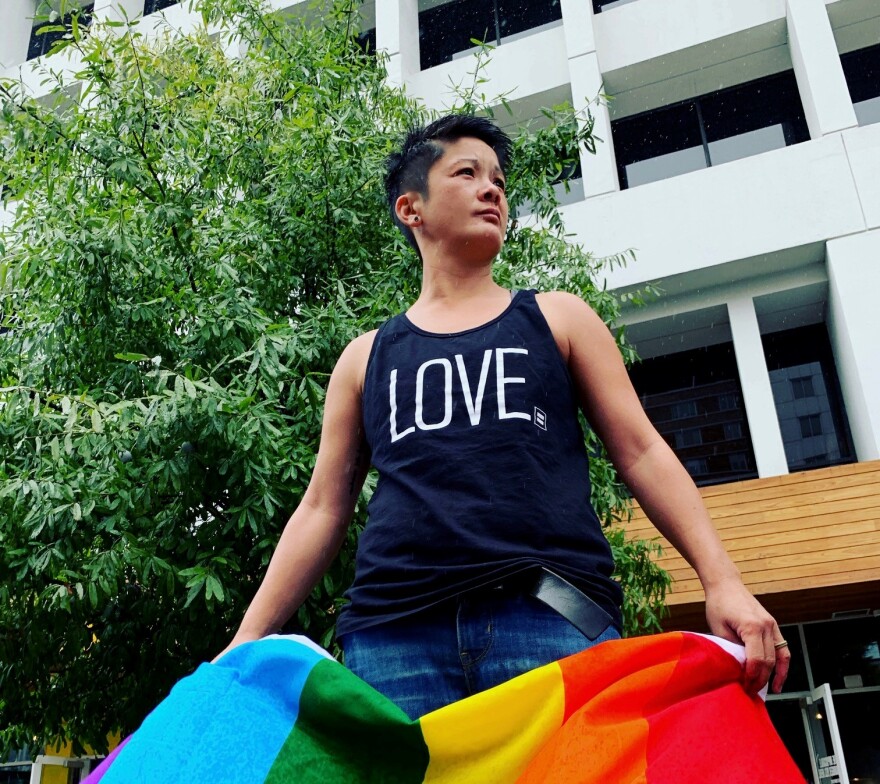*Advisory to listeners (readers), this story contains ethnic and homophobic slurs.
Reports of assaults on Asian-Americans are on the rise in the time of COVID-19, as some have blamed the pandemic on China. An organization representing Asian-Americans in North Carolina announced this week it will start collecting reports of racially-charged incidents in the wake of Coronavirus.
One local incident will be included in that database.
Like many chefs spending more time at home these days, J Chong has been cooking up creative ways to share her beloved Cantonese food.
For one, the former Curate sous chef started making and selling batches of dumplings by the dozen over Instagram. She makes the filling, seals the wonton wrappers with a delicate crimp, and delivers them frozen to customers to cook at home.

"It’s been received pretty well, so I'm excited," Chong said. "I think this will be a new path, a new avenue for me, to try to get creative with how to feed the community because it’s going to be a long time until we all get into restaurants and sit in there comfortably together."
Another way Chong is reaching others in the time of social distancing is through virtual cooking classes.
But one of those classes last month took an unexpected turn.
"Some racial and homophobic slurs were thrown at me," Chong explains. "I was called a ‘chink’ and I was called a ‘faggot.’ I was called those names, and the last comment that was made directly to me was, 'you *****ng chink, the coronavirus is happening because of you.”
Chong hosted the class on Zoom for the Campaign for Southern Equality, a gay rights organization. Her wife Danielle Wheeler was filming on an iPhone, while Chong prepared spinach pesto. Then more people began to join the online class, and she was “Zoom bombed,” as it’s been called.
“It didn't really affect me, to be quite honest with you because I’ve been called these before things in my life," Chong said. "I’m 42 years old. I’m a queer Asian. I’ve been out for almost a little more than half of my life, and I’ve lived in Toronto, Mississippi, Louisiana and North Carolina. I’m unfortunately kind of used to those things happening to me."
But she says what hurt the most, was looking at the screen and seeing the upset reactions of her friends and followers.
Chong is sharing her story because she wants to use her voice to call out injustice and racism that’s still prevalent, particularly in the South.
But for many victims of racial attacks, coming forward to report an incident can be difficult, or even re-traumatizing.
“Knowing that this is happening to more folks than me, might give folks more comfort, and feel safer," Ricky Leung, communications and outreach director for North Carolina Asian-Americans Together, said. The organization supports Asian-Americans through services, like voter registration and connecting non-English speakers to resources in their native language.
“A balance of making sure that we are responsible to our community needs and also not fanning the flames and giving oxygen to Anti-Asian sentiments," Leung said. "That is one of the reasons why we are putting together this bias reporting portal to make sure we have an accurate picture of the prevalence and severity of Anti-Asian incidents that’s occurring during Covid-19.”
He adds xenophobic rhetoric and acts against Asians are not new -- the pandemic has only amplified the problem. That’s why Leung says gathering the anonymous reports of recent incidents will help the organization expand its advocacy efforts. It’s also about highlighting the resilience of the immigrant community.
“In our narratives, in our power to help each other and our cultural knowledge, in our legacy from our upbringing here and from our ancestors from all over the world,” Leung said.
In Asheville, J Chong is continuing to push that narrative forward in sharing her Cantonese food. Chong says she’s made more than 1,400 dumplings in quarantine, and she’s received overwhelming support from the community in response to the Zoom incident.
“And community is how we survive. The restaurant industry right now in Asheville is suffering largely, and it’s a lot of my friends, people I care about, are out of jobs," Chung said. "It’s so unfortunate, but I think we’re coming together in ways that being in an everyday grind would not allow us to.”
In addition to Chong’s dumpling delivery service, she prepared 50 plates of lo mein and stir fry last month for the homeless who are housed at the emergency shelter downtown. She’s also hosting another virtual class this Friday.



